- Home
- Gerald Hammond
The Curse of the Cockers Page 6
The Curse of the Cockers Read online
Page 6
Angus buried his face in his soup mug as though to wash away a bad taste. The room was silent except for the rustle as Isobel gathered up her papers. As a local, she had heard the details before. Beth and I were struck dumb by the raw cruelty of it. Angus might have a temper but I knew that he could never have left a man to die. In the Falklands, I had seen him carry a wounded prisoner to safety although he was bleeding from a bullet wound inflicted earlier by the same man after waving a white flag of surrender.
Beth refilled Angus’s mug with soup. He looked down without seeming to notice it. ‘You’ll see why I need to get my affairs straight,’ he said. ‘I’ve done nothing wrong and I’m not afraid of the law, but if they charge me wi’ anything more than leaving the scene of an accident I could be . . . busy . . . for a good while. I’m trying to fix for somebody to look after the business if the worst comes to the worst. One thing I’ll need to know soon is, are you interested in my proposition?’
I pulled my mind back from death and thought about Angus’s proposal. As both he and Isobel had implied, it made a great deal of sense for a training kennels to be closely associated with a shoot. My subconscious mind, I discovered, had thrown up a dozen ways in which any extra work could be absorbed into our daily routine. We would have to borrow, but if the proposition was sound – which had yet to be established although the figures that Angus had written down looked good – it would be into the black by the end of the first year. My reluctance, I realized, came from a deep disquiet about attitudes.
During my boyhood, the owner of land might shoot over it with friends or guests. Economic pressure had diminished that gentlemanly scene almost to vanishing point. We had seen instead the rise of the syndicate, paying a rent for the sporting rights, sharing the costs or the labour of keepering, continuing to make improvements to the woods and coverts and learning all the time about how to hold the game and how best to walk up or drive the land. This I could understand and approve.
I was less happy about the new growth of commercial sporting estates, letting the shooting by the day or week and charging by the number of birds in the bag. For the busy visitor, it might make a sort of sense. He was relieved of the distractions of operating a syndicate. The cost of getting his few days of top-class shooting might not be much greater than the subscription to a syndicate of equal quality, on top of which he could choose his days and shoot in a different part of the country every weekend, if he so wished and if his purse was deep enough. But somehow I felt that he would have made a bad bargain. The changing scenery might please his eye but he would never come to identify himself with the fields and coverts.
Beth and Isobel were watching me. I decided that if the better-heeled shooting men were pleased to put money our way in exchange for only superficial enjoyment, it would be only gracious to accept it with equal pleasure.
‘We could be,’ I said at last. ‘We’d have to think it over after we knew exactly what land you were talking about.’
Angus, it was clear, was still afraid of being outbid. ‘You wouldn’t—’
‘We’d need you as much as you’d need us,’ I said.
He thought it over, nodding slowly, and then shrugged. ‘Foleyknowe,’ he said. ‘Between the Carse of Gowrie and the Pentland Hills. Not too far from here, going over the Road Bridge.’
‘But it’s as bare as your hand,’ Beth said.
Angus shook his head and managed a half smile. ‘It looks that way,’ he said. ‘That’s why there’s no interest. But Mr Crae, when he was alive and had the sporting lease, put in more than three thousand trees, mixed deciduous and conifers. You don’t see them. For one thing, they’re only three years old, just ready for a burst of growth. For another, they’re mostly along the streams down in the low ground, out of the sight of the passers-by. His idea was that you put game crops and feeders higher up. Then you’re driving the birds off the high ground towards home in the woods. That way they should be high and fast.’
Isobel and Beth were still watching me, waiting for my judgement.
‘I’ll go over and take a look within the next few days,’ I said. ‘Then we’ll let you know.’
‘That’ll have to do.’ Angus looked at the clock on the mantelpiece and heaved himself to his feet. ‘Now I must away for home.’
‘If you’ve no other calls to make around here,’ I said, ‘one of us will give you a lift.’
Chapter Four
Beth had a profound distrust of any man exuding such a macho image as did Angus, but she was always sympathetic towards anyone in trouble. She invited him to stay for a bite of lunch, but Angus, now that he had said his piece, was in a hurry to go.
When I offered Angus a lift home, I had had Daffy in mind as chauffeur – her eccentricities did not extend to her driving. But the usual female conspiracy went into action to keep me from standing around in the cold or tiring myself out and I found myself elected as driver.
We loaded Angus’s bike into the back of my old estate car and set off.
‘When you first parked behind the inn,’ I said, ‘were any other Land-Rovers there already?’
He racked his memory for a full minute before replying. ‘There was maybe one,’ he said at last. ‘Or maybe it was a Fourtrack. If there was, it needn’t mean anything. Every farmer has one similar. And half the shooting men, if they can’t afford a Range Rover or a Shogun. The other half have a family car and something smaller like a Suzuki, or else the family car’s a four-wheel drive. Anyway, I couldn’t be sure. I wasn’t looking out for Land-Rovers, I was watching for the Jag of the man I was to meet, in case he’d arrived before me.’
‘Did you recognize even a single car?’ I asked. ‘Or did you meet anyone in the bar who couldn’t have walked there? If so, you’d have a starting point. One man might recognize another car when he came or left and so onward. It’s the kind of information your solicitor will need if the case comes to court.’
‘I thought of that for myself,’ he said. ‘There was maybe a dozen cars but I wasn’t looking at them. The only man I could swear to was one I saw inside. Willy Chambers.’
‘I don’t know him,’ I said.
‘No, you wouldn’t. He lives a mile or two from me, in one of those new bungalows with as much character as a paper bag. Drives around in a flashy Mercedes.’
‘You didn’t see the Mercedes in the car park?’
‘Not to notice it. I’ve been to see him, but it’s no go. He hates my guts. See, he’s one of these smiling characters who aye gets his own way. Whatever it is, he does it first and apologizes afterwards and charms his way out of it. He aye stops just short of the point where it’s worth anyone’s while to take him to court.’ Angus seemed more comfortable now that we had moved away from his problems to where he could be his usual abrasive self. ‘He wanted to build a cluster of upmarket houses on the rough land just behind my place and I wasn’t for it. But he made a start before his planning permission was through, on the say-so of one of the councillors. So I made a song and dance about it and he was stopped. That made them come and take a right look at it and they could see that it was in the wrong place. What’s more,’ Angus added with satisfaction, ‘I got onto the Nature Conservancy Council and all those chiels, and now it’s designated a Site of Special Scientific Interest.’
‘And he’s stuck with the cost of the land and a penalty for breaking his contract with the builder.’
‘Plus a backhander to the councillor, I wouldn’t doubt. I spoke to him, but what he told me was a load of shit. He’d like fine to me get shafted.’ Angus stopped dead and lowered his voice. ‘I was wondering . . .’
‘Yes?’
‘I swear to God that I know nothing about any of this,’ he burst out. ‘Do you think . . . Captain Cunningham . . . you could help me? Even if it’s only advice? I’ve nobody I could bring myself even to talk it over wi’. I’ve a cousin near here, he’s in the police, but he’s no good to me. He’s been told his job’s on the line if he as much as speaks to me.�
��
I let the word ‘Captain’ go by for once. Angus was appealing to me as soldier to officer. I realized that responsibility for one’s men was a burden that never lifted. It was a one-sided obligation but it was there nevertheless.
I had no desire to embroil myself in Angus Todd’s affairs. Despite my assessment of his character, I knew that such judgements could often be wrong. Angus might be as guilty as hell and I might seem guilty by association. But he had served me well and I owed him my help. ‘You can come and talk it over any time,’ I told him. ‘And if I get the chance I’ll see what I can find out.’
I turned off the tarmac road onto a gravel track leading to where Angus’s house, formed by the neat conversion of two old workmen’s cottages, stood against a background of sheds and rearing pens. The place looked naked without the Land-Rover at the door. ‘My best advice,’ I added, ‘would be to get a really good solicitor on the case as soon as possible.’
‘That’ll cost,’ he said gloomily.
‘It’ll cost a damn sight more if the thing goes the whole way and you have to face a charge of murder.’
There was just enough room to turn a vehicle. I backed round and stopped. A boy and girl were playing with Angus’s retriever on a patch of grass but Bruce, his black cocker spaniel, ran to the car and jumped up against the passenger door.
‘Bruce hasn’t been out at stud, has he?’ I asked. Guilty or innocent, if Angus had accepted the pick of a litter instead of a stud fee, he might well be reluctant to admit to the lost pup.
He knew what I was driving at. ‘Just the once,’ he said. ‘To a bitch in St Andrews. And not an all black pup in the litter. Get down, you bugger,’ he added to Bruce.
We got out of the car. As Angus lifted the bike out of the back, Mrs Todd came to the door in a clean apron, a homely woman in middle age but with delicate features that could still look unexpectedly girlish when the light and the mood were right. She looked a question at Angus and he nodded. ‘The Captain says that he’ll help,’ he said. He wheeled the bicycle towards a small shed.
She smiled unhappily and came forward, offering her hand for a shake. ‘I’ll do what I can,’ I said. ‘It may not be much.’
I tried to detach my hand but she held onto it tightly. ‘It’ll mean a lot to him, just to have somebody on his side that he can trust.’ She had her voice back under control although I preferred her natural voice, accent and dialect and all, to the rather prissy diction that she used when she was ‘talking pan loaf’. ‘He hasn’t many friends around here. It’s not everybody who can stand up against the sharp side of his tongue.’ She sounded almost proud of Angus’s gift of invective. ‘Won’t you come in?’
‘Another time. My lunch will be on the table,’ I said.
She nodded sombre acceptance and then brightened as the laughter of the two children reached us. ‘Mrs de Forgan leaves the children here when she’s over this way,’ she said. ‘I’ve known them since they were toddlers.’
I recovered my hand and got back into the car. She stooped to the window, effectively preventing me from either getting out again or driving off. I wound down the glass.
‘Angus would do none of those things,’ she said. ‘I know him. He has a temper, but if he did violence to another man it would be fair and face to face. And as for his having a fancy woman in Dundee, that’s just haivering. He couldn’t have kept such a thing a secret from me. He’s a once a week man, regular as clockwork, and always has been ever since we were courting. There’s been no change in that department.’
She stood up and stepped back. I drove away before any more confidences could be wished on me.
*
When I got back to the Three Oaks, Isobel had embarked on her weekly check of our stock for infections, ticks, and wounds while Daffy was busy with the eternal chores of cleaning, feeding, and exercising. Beth was alone in the house. She put some lunch on the table and stood over me to make sure that I ate it.
‘Angus asked me to help him,’ I told her between mouthfuls.
‘To prove his innocence?’
‘I suppose so. Or at least to throw doubt on his guilt.’
‘Suppose that he’s guilty?’ she asked, putting her finger, as usual, on my worst fears.
‘In that case I’ll have wasted my time, that’s all. A search for the truth can’t do any actual harm.’
‘Some of the dirt could rub off on you.’
‘I’m not sure that I care a lot for the opinion of anybody dim enough to think that way,’ I said.
‘Even clients?’
‘I’ll just have to risk it. I owe Angus that much. And I don’t think he’s guilty.’
‘I don’t have much of an opinion either way,’ she said thoughtfully. ‘It doesn’t look too good. But it would be awful if he was perfectly innocent but nobody was prepared to stand by him.’ She settled in the chair opposite mine. ‘All right. I’ll help if I can. Don’t go tearing around all over the place, tiring yourself out and missing meals. Where do we start?’
I gave it some thought. ‘The easiest starting point, and one where we have an edge over the police, is the pups. We know who to speak to and what to say. There can’t have been so many litters of black working cockers in mid-November and, of those, many of the pups will still be with their dams. We could find out which pups can’t be accounted for.’
Beth was quick to pounce on what she saw as an opportunity to keep me at rest in front of a warm fire. ‘You could get on with that now,’ she said.
‘Later. More people are at home in the evenings,’ I said. I have a phobia about running up phone-bills. At least the calls would be cheaper in the evening. ‘And with the championship coming up, our two hopefuls need to be kept up to scratch.’
‘Do you need me to come and fire the dummy-launcher for you?’
‘What about Sam?’
‘I could bring him along in the papoose-thing. He’ll only sleep all afternoon anyway.’
‘Not if you’re shooting off the dummy-launcher,’ I pointed out.
‘That’s true. Well, all right. Wrap up well.’
I wrapped up well, fetched a gun, a blank cartridge adaptor, some blanks, and a belt of shot-gun cartridges from my store, slung a bag of dummies and the dummy-launcher over my shoulder, and went to collect the two spaniels. I took them across the road at heel and then let them blow off steam, racing each other in circles as we crossed a vacant pasture to the Moss. I soon decided that I had wrapped up rather too well for carrying a load of equipment over uneven going.
I could hear shots from the Moss, which boded ill for steadiness training. The Moss was riddled with holes and all the rabbits would by now be underground. The prospect of having exclusive access to a commercial shoot made more and more sense. We would be able to start the season with the dogs knowing the difference between the scents of a pheasant and a songbird. Well, I could still do some work with the dummies, but first I ought to make contact with the shooters and let them know that I was around with the dogs.
I cast Rowan out and he hunted through the scattered gorse within gunshot of me but, as I thought, any rabbits were well underground. I called him back to heel and we pushed through the last stand of alders.
Near the middle of the Moss, on the one flat and dry stretch of ground, two men had set up a light clay pigeon trap and were having a little informal practice. As I approached, the one with the over-under gun in his hands dropped his barrels and I did the same.
The other man got up from his seat on the clay trap. ‘Sorry if we’ve spoiled things for you,’ he said. I recognized Constable Peel who was, I knew, a clay pigeon enthusiast.
‘One door shuts, another opens,’ I said. ‘It gives me a chance to remind the dogs that they stay put until they’re sent out. Do you mind if I join you?’
‘You’re more than welcome.’ His Irish accent was more noticeable when he was off duty. ‘Do you know Harry Piat?’
I shook hands with Harry Piat, a small, lean man with
a face that looked ready to smile. I had seen him somewhere before.
They changed places. The dogs sat as though they had taken root while Piat missed two curling clays and broke seven, so I took a turn. Rowan ruined my concentration. He had developed a weird habit of shaking his head and snorting whenever I missed. Both dogs stirred in sudden interest when I exchanged my gun for the dummy-launcher. Giving them each a long retrieve, with a stop whistle during the outrun, interrupted the claybusting for a minute or two, but I made up for it by taking over the trap for a while.
‘I must be going,’ Harry Piat said suddenly. ‘Got to get ready for the night shift. Do you want anything lugged back to your house?’
‘I can manage,’ Peel said. ‘Thanks anyway.’
Piat shook hands with me again, patted both dogs and set off across the Moss.
‘Another policeman?’ I asked.
Peel shook his head. ‘Not him. He lives in Wormit but works in Dundee. NCR, I think. We’re members of the same clay club.’
‘I’ve seen him before.’ It was coming back to me. ‘He was in the bar at Hogmanay.’
‘We knew that.’ Peel looked at me thoughtfully and decided to open up a bit more. ‘He couldn’t tell us anything useful. His wife had to ask a neighbour for a lift over here so that she could drive him home. At least he still had the sense to phone for her.’
He was practising for an imminent competition. I threw some more clays for him and he returned the compliment by using the dummy-launcher before we decided to quit.
‘I’ll pick up the unbroken clays,’ Peel said. ‘They cost money. No need for you to wait around.’
‘The dogs can make short work of it,’ I said. ‘They’ve done the job before.’
The trap had remained in the one place with the shooters moving around to get a change of birds, so that the unbroken clays were scattered over a small area. The two spaniels galloped happily around, retrieving the clay pigeons in their gentle mouths.

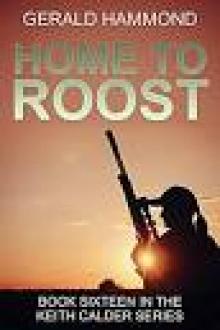 Home to Roost
Home to Roost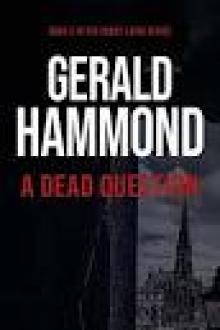 A Dead Question
A Dead Question Twice Bitten
Twice Bitten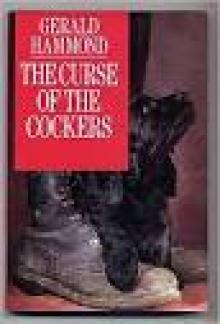 The Curse of the Cockers
The Curse of the Cockers In Loving Memory
In Loving Memory Illegal Tender (Three Oaks Book 12)
Illegal Tender (Three Oaks Book 12) Cold Relations (Honey Laird Book 1)
Cold Relations (Honey Laird Book 1)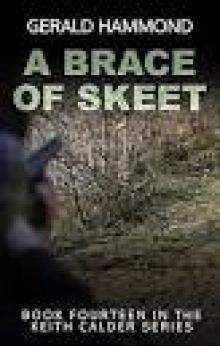 A Brace of Skeet
A Brace of Skeet Silver City Scandal
Silver City Scandal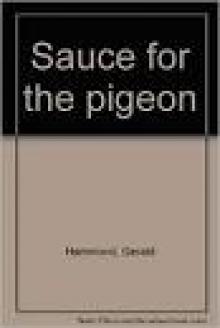 Sauce For the Pigeon
Sauce For the Pigeon Cold Relations
Cold Relations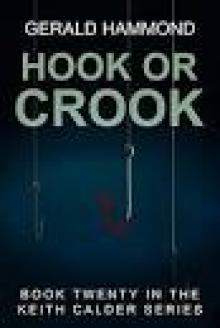 Hook or Crook
Hook or Crook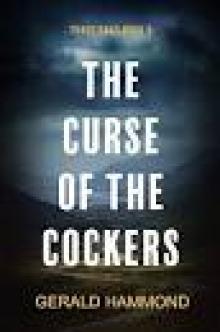 The Curse of the Cockers (Three Oaks Book 5)
The Curse of the Cockers (Three Oaks Book 5)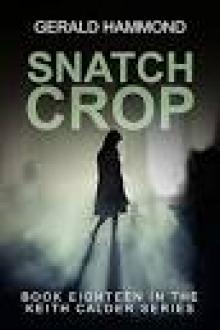 Snatch Crop
Snatch Crop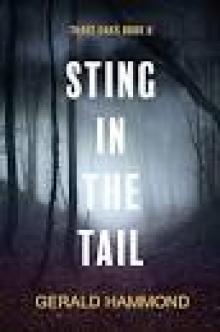 Sting in the Tail (Three Oaks Book 6)
Sting in the Tail (Three Oaks Book 6)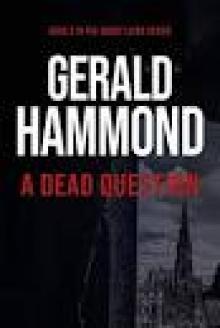 A Dead Question (Honey Laird Book 2)
A Dead Question (Honey Laird Book 2)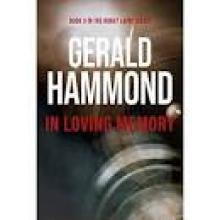 In Loving Memory (Honey Laird Book 3)
In Loving Memory (Honey Laird Book 3) Thin Air
Thin Air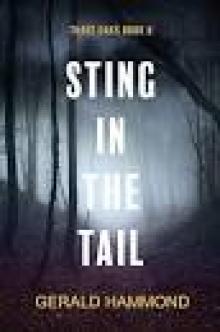 Sting in the Tail
Sting in the Tail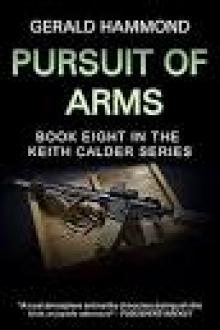 Pursuit of Arms
Pursuit of Arms The Game
The Game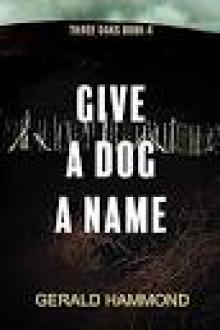 Give a Dog a Name (Three Oaks Book 4)
Give a Dog a Name (Three Oaks Book 4) Fair Game
Fair Game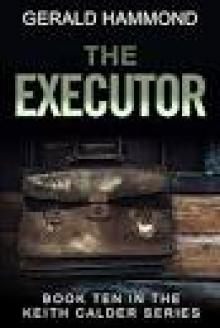 The Executor (Keith Calder Book 10)
The Executor (Keith Calder Book 10) Whose Dog Are You? (Three Oaks Book 2)
Whose Dog Are You? (Three Oaks Book 2)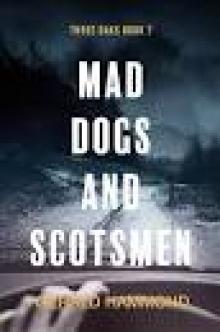 Mad Dogs and Scotsmen (Three Oaks Book 7)
Mad Dogs and Scotsmen (Three Oaks Book 7) Cousin Once Removed
Cousin Once Removed The Worried Widow
The Worried Widow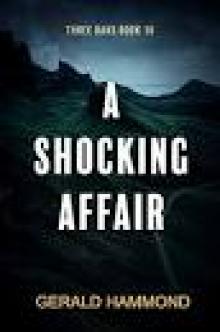 A Shocking Affair
A Shocking Affair Dead Weight (Three Oaks Book 11)
Dead Weight (Three Oaks Book 11) Whose Dog Are You
Whose Dog Are You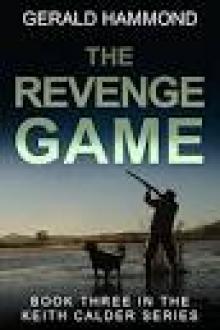 The Revenge Game
The Revenge Game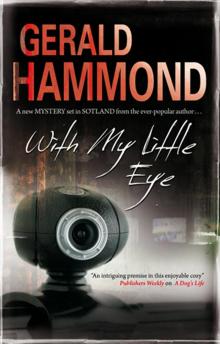 With My Little Eye
With My Little Eye Doghouse (Three Oaks Book 3)
Doghouse (Three Oaks Book 3)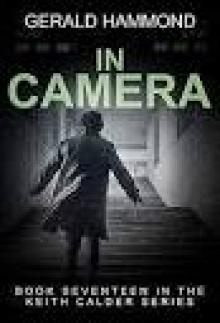 In Camera
In Camera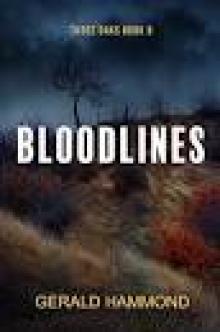 Bloodlines (Three Oaks Book 8)
Bloodlines (Three Oaks Book 8)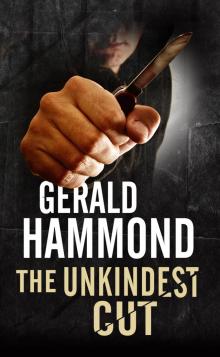 The Unkindest Cut
The Unkindest Cut